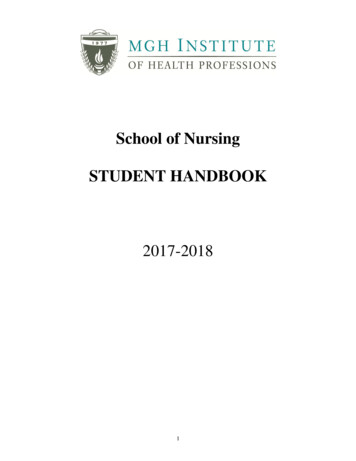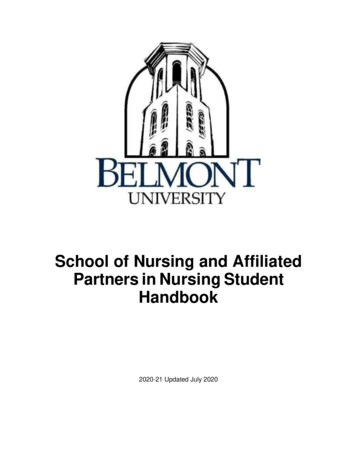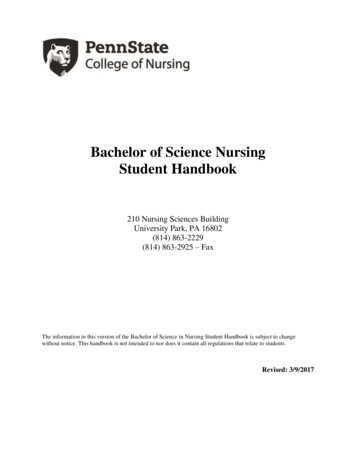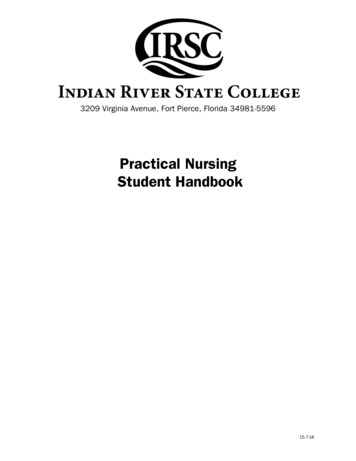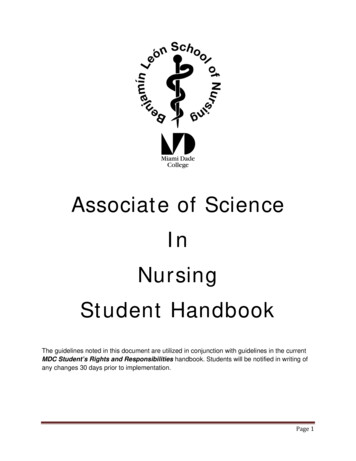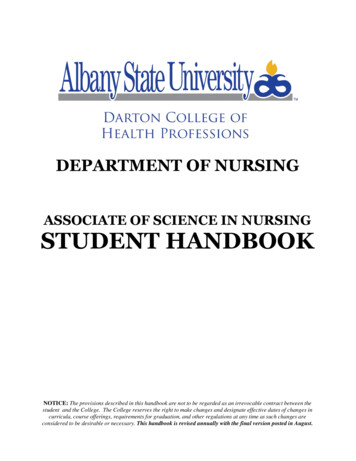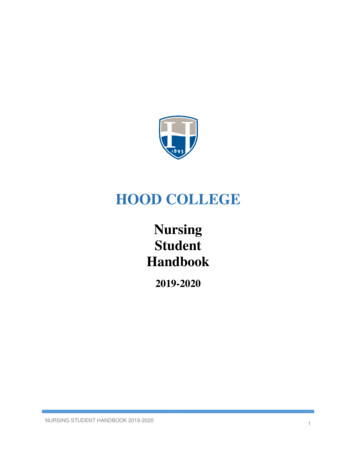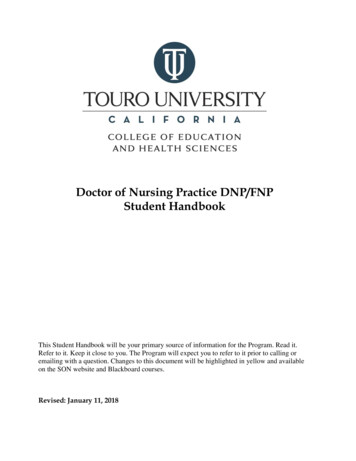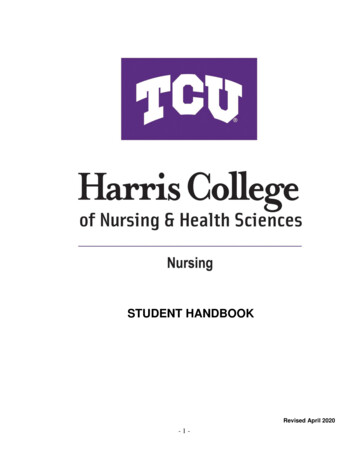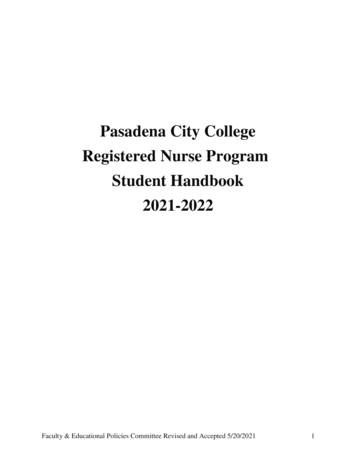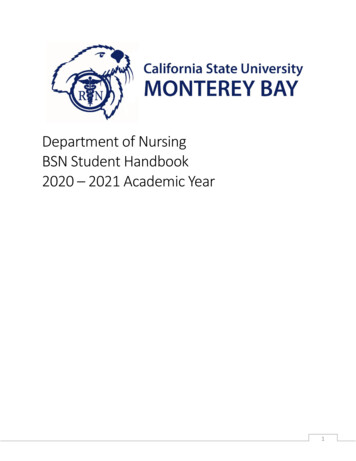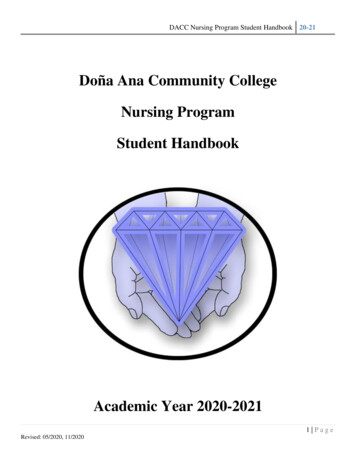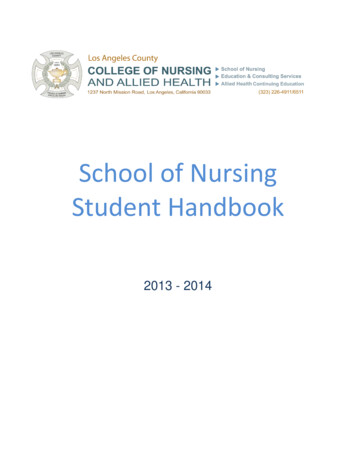
Transcription
School of NursingStudent Handbook2013 - 2014
Los Angeles County College of Nursing and Allied Health2013-2014 School of Nursing Student HandbookLOS ANGELES COUNTY COLLEGE OF NURSING AND ALLIED HEALTHSCHOOL OF NURSINGSTUDENT HANDBOOK2013-20141237 N. Mission RoadLos Angeles, CA. 90033-1084Telephone (323) 226-4911Website: CURACY STATEMENTThe Los Angeles County College of Nursing and Allied Health has made every effort to determine that thestatements in this handbook are accurate.The College reserves the right to make changes affecting programs, policies, regulations, requirements, fees,and/or any other matters.All matters contained herein are subject to change with or without. The College assumes no responsibility formisrepresentation of the information presented.Page 2 of 86
Los Angeles County College of Nursing and Allied Health2013-2014 School of Nursing Student HandbookSCHOOL OF NURSING ADMINISTRATIONBarbara Collier, MEd, RNDean, School of NursingJudith Sherman, MSN, RNCoordinator, Semester 1Joan Kohl, MSN, RNCoordinator, Semester 2Jeffrey Anderson, MSN, RNCoordinator, Semester 3Leonece Myers, MSN, RNCoordinator, Semester 4Page 3 of 86
Los Angeles County College of Nursing and Allied Health2013-2014 School of Nursing Student HandbookTABLE OF CONTENTSIntroduction .6General Information .8History of the School of Nursing .9Mission, Vision, and Values .10Philosophies of Education, General Education, and Learning.11School of Nursing Philosophy .12Student Learning Outcomes.13College.13General Education .13School of Nursing.13CoursesLevel I, Semester 1.14Level I, Semester 2.14Level II, Semester 3.15Level II, Semester 4.16Conceptual Framework .17Purpose Statement.18Program Objectives .18General Policies and Guidelines.19Student Enrollment, Registration, and Progression Policy .20Board of Registered Nursing: Denial of Licensure Policy Statement .21Security and Safety Orientation .22Student Health .23Hospitalization.23Illness Reporting .23Pregnancy .23Research Subjects .26Illness or Injury Policy .24Impaired Student – BRN Guidelines .26Impaired Student Policy .26Written Communications .28Student Mailboxes .28Change of Name or Address Policy .29Academic Progression Policies .31Academic Warning Notification Policy .31Students Using Veteran Affairs (VA) Benefits .31Academic Failure, Withdrawal, and Dismissal Policy .32Continuing Student Status.33Petition for Waiver of College Policies and Regulations .34Readmission .34Page 4 of 86
Los Angeles County College of Nursing and Allied Health2013-2014 School of Nursing Student HandbookTransfer to Another School of Nursing .35Academic Program Policies .36Drug Dosage Competency .37Test Review .38Make Up Examination .39Attendance of Clinical Courses .40Course, Instructor, and Program Evaluation .41Graduation/Post Graduation .42Graduation Eligibility.43Graduation and Awards Policy .43Transcript/Completion Verification Requests .46Transfer to BSN/MSN Programs .46Employment Opportunities .46Student Rights and Responsibilities .47Nursing Student Bill of Rights48Student Responsibilities .49Dress Code.51Student Organizations and Clubs .54Organizations and Clubs .55Associated Student Body .55California Nursing Student Association .55Newman/Nurses' Christian Fellowship Club .55Associated Student Body Bylaws .56Faculty Advisors .69Student Committee Representatives .69Year Book.70Student Activities Policy and Procedure .71Fund Raising Policy and Procedure .72Alumni Association .74Alma Mater.76School of Nursing Administration and Faculty .78Index.83Page 5 of 86
Los Angeles County College of Nursing and Allied Health2013-2014 School of Nursing Student HandbookPage 6 of 86
Los Angeles County College of Nursing and Allied Health2013-2014 School of Nursing Student HandbookINTRODUCTIONPage 7 of 86
Los Angeles County College of Nursing and Allied Health2013-2014 School of Nursing Student HandbookINTRODUCTIONThe School of Nursing (SON) offers a four-semester, prelicensure nursing program thatincludes advanced placement options. The program prepares students for entry level practiceand culminates in an Associate of Science Degree in Nursing. Students who successfullycomplete the program are eligible to apply for the National Council Licensure Examination forRegistered Nursing (NCLEX-RN) and to seek employment as an entry level registered nurse.The SON completion and graduation rates may be found on the Integrated Post-SecondaryEducation Data System (IPEDS) website as well as on the College website. The CollegeNCLEX-RN pass rates may be found on the California Board of Registered Nursinghttp://rn.ca.gov/schools/passrates.shtml and rsing websites.The SON program admits new students to the first semester and Licensed Vocational Nurses(LVNs) enter as advanced placement students in the third semester. LVN to RN AdvancedPlacement Options are described in the SON Admissions policy.The philosophy, student learning outcomes, and objectives of the educational program givedirection to the development and implementation of the curriculum. The SON courses adhereto California Board of Registered Nursing (BRN) curriculum guidelines.The SON faculty regularly evaluate and revise the philosophy, learning outcomes, objectives,policies, and curriculum in order to maintain a current and effective program of study.Students implicitly agree upon admission, that they will comply with the rules and regulationsprinted in the College Catalog, SON Student Handbook and other official College and Schoolcommunications.Barbara Collier, MEd, RNDean, School of NursingPage 8 of 86
Los Angeles County College of Nursing and Allied Health2013-2014 School of Nursing Student HandbookGENERAL INFORMATIONPage 9 of 86
Los Angeles County College of Nursing and Allied Health2013-2014 School of Nursing Student HandbookHISTORY OF THE SCHOOL OF NURSINGThe Los Angeles County College of Nursing and Allied Health has a long and distinguishedhistory of educating health care professionals.The School of Nursing founded in 1895, was called the College Training School. It was atwenty-four month, hospital-based program under the direction of the County Hospital and theUniversity of Southern California College of Medicine. The training program shifted from theCollege of Medicine to the County Hospital and was officially approved by the County Board ofSupervisors in 1901 and titled the Los Angeles County Hospital College of Nursing. With there-titling of the hospital as the Los Angeles County University of Southern California MedicalCenter in 1968, the School was renamed the Los Angeles County Medical Center School ofNursing. The name, the Los Angeles County Medical Center School of Nursing, was retainedwhen the college was granted initial accreditation status by the Accrediting Commission forCommunity and Junior Colleges, Western Association of Schools and Colleges in 1995 andwas authorized to grant Associate Degrees. In 1998 the School of Nursing and the NursingEducation and Consulting Services division of the LAC USC Medical Center merged to formthe Los Angeles County College of Nursing and Allied Health. The Board of Supervisorsapproved renaming the institution to reflect its expanded educational role.The School of Nursing has a main campus at the Los Angeles County University of SouthernCalifornia Medical Center and offers clinical rotations at other Department of Health Services(DHS) facilities including Olive View-UCLA Medical Center, Rancho Los Amigos MedicalCenter and Harbor-UCLA Medical Center. Graduates now number almost ten thousand.County graduates have served with distinction and are recognized nationwide as outstandingpractitioners in nursing.Page 10 of 86
Los Angeles County College of Nursing and Allied Health2013-2014 School of Nursing Student HandbookMISSION, VISION, AND VALUESMissionTo provide learning centered educational programs and career development opportunities forhealthcare students in support of the Los Angeles County Department of Health Services.VisionTo be a model learning centered educational system providing a continuum and breadth of educationand professional development to promote health in the Los Angeles community.ValuesTo aid us in achieving our mission and vision we believe: Education is an indispensable component of quality healthcare.Education is a dynamic, life long process that promotes and maximizes both personal andprofessional development.Our priority is to respond to the educational needs of our students, the LAC USC Medical Center, ,Department of Health Services and the community.Learning activities that provide for freedom of inquiry, self-discovery and sharing of ideas areconducive to individual growth.The teaching-learning process is a reciprocal relationship between learner and teacher, whichmaximizes learner autonomy, and is effective when achievement of learning outcomes isdemonstrated.The climate of learning is enhanced when the dignity and worth of individuals with different abilities,learning styles, support systems and cultural and ethnic backgrounds are recognized.Ongoing evaluation of our performance and openness to change are essential as programs grow,technology changes, and learning methods evolve.Teamwork promotes flexibility, collaboration, innovation, and networking.Integrity, professionalism, and respect are inherent to our relationships with each other, ourstudents, our partners and the community.Fiscal responsibility is vital to ensuring the maximum benefit from DHS resources.Motto“There is no education like it in the world”Page 11 of 86
Los Angeles County College of Nursing and Allied Health2013-2014 School of Nursing Student HandbookPHILOSOPHIES OF EDUCATION, GENERAL EDUCATION, AND LEARNINGPhilosophy of EducationEducation is a dynamic, life long process that promotes personal and professionaldevelopment. Education provides a formal system for the intellectual, emotional and socialgrowth of individuals. The individual engages in an interactive communication process toacquire knowledge, develop potentials and capabilities, enhance and modify attitudes, andfoster a spirit of inquiry. The educational system provides the learner a foundation upon whichto build understanding of our culturally and ethnically diverse society.Philosophy of General EducationStudents with a broad-based general education foundation are better able to synthesizeempirical knowledge, make critical judgments, and generate sound decisions. The broadlyeducated student is prepared to participate in various roles that are necessary to meet thehealth care needs of individuals in a rapidly changing society at local, national, and globallevels. Selection of prerequisite and co requisite courses from the natural and social sciences,humanities, and communication contribute to and support the student’s ability to analyze,understand, and modify experiences.Philosophy of LearningLearning is goal-oriented and fostered in an open climate that encourages decision-makingbased on knowledge and critical thinking. Learning is a process requiring multiple stimuli andactive student-teacher involvement. Learning activities that provide for freedom of inquiry, selfdiscovery and sharing of ideas are conducive to individual growth. The teaching-learningprocess is a reciprocal relationship between student and teacher, which maximizes studentautonomy. Teaching is effective when the learner demonstrates goal achievement. The climateof learning is enhanced when the dignity and worth of individuals with different abilities,learning styles and support systems are recognized. Each student learns and develops as awhole person, with his/her own unique style, abilities, and personal learning goals. Pastexperiences, cultural and ethnic backgrounds must be appreciated in order to assist andmotivate the learner. Students are responsible for participating in activities, which promotemastery of learning tasks and achievement of goals.Page 12 of 86
Los Angeles County College of Nursing and Allied Health2013-2014 School of Nursing Student HandbookSCHOOL OF NURSING PHILOSOPHYTHE FACULTY BELIEVE:NURSING EDUCATION is a continuous process that builds upon a theoretical base fromrelated disciplines. Nursing education emphasizes theoretical knowledge and principles toguide and influence the practice of nursing. The goal of nursing education is to preparestudents with the knowledge, skills, and sociocultural sensitivity necessary for assisting man tomaintain health.MAN is an individual, family, group or community with inherent worth and dignity. Manfunctions in a holistic, harmonious manner and is viewed as an open system with fiveinterrelating variables that are always present and determine the nature and degree of stressexperienced.ENVIRONMENT consists of both internal and external forces that influence the system stabilityof man. System stability is dependent upon man's ability to adapt to environmental forces.HEALTH is a dynamic and ever changing state of system stability. Health exists at variouschanging levels
College of Medicine to the County Hospital and was officially approved by the County Board of . Center and Harbor-UCLA Medical Center. Graduates now number almost ten thousand. . VISION, AND VALUES . Mission To provide learning centered educational programs and career development opportunities for healthcare students in support of the Los .
